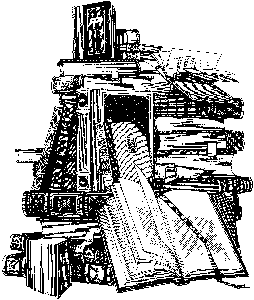 Every intelligent, well-educated individual should have a personal library comprised of the books which he or she loves, has enjoyed, and has benefited from. Books, after all, are that incomparable source of knowledge, wisdom, and literary pleasure. We all may have computers and laptops, but there is nothing so personal and engaging as a book itself. That is why readers are willing to pay large sums of money to obtain beautifully bound books written by the authors they enjoy reading.
Every intelligent, well-educated individual should have a personal library comprised of the books which he or she loves, has enjoyed, and has benefited from. Books, after all, are that incomparable source of knowledge, wisdom, and literary pleasure. We all may have computers and laptops, but there is nothing so personal and engaging as a book itself. That is why readers are willing to pay large sums of money to obtain beautifully bound books written by the authors they enjoy reading.
Most homeschoolers become voracious readers because they've been taught to read with intensive phonics. They easily become attached to the books they have read, and therefore they build their own libraries quite naturally. That should be the core of one's own book collection.
But book collecting itself is also a great hobby.
Signed, First Editions
Readers will often line up at a bookstore to get a signed copy of a newly published book. A signed copy of a book immediately increases its value. In fact, there are book dealers who specialize in signed first editions.
If you study the prices of first editions of important books, it becomes obvious that investing in books can be (literally) a very enriching hobby.
Book auctions are a good place to start looking for valuable books. You might find some hidden treasures at your local library's annual book sale. Second-hand bookstores are good places to browse. And, of course, an antiquarian bookstore that specializes in rare books is probably the best place to learn about the value of books.
For example, a first edition of William Faulkner's The Reivers, inscribed by the author, sells for $24,000. A first American edition of Lewis Carroll's Alice's Adventures in Wonderland has a price tag of $16,000. A first edition of Harriet Beecher Stowe's Uncle Tom's Cabin can be bought for a mere $12,800. A signed, first edition of Hemingway's Death in the Afternoon fetches $21,000.
In other words, if you want to start collecting books, get first editions and, if possible, get them signed by the authors.
Of course, not all books become collectibles. That includes not only bad books, but also many old or "vintage" books that never became popular or were of no literary value. However, books that contributed to the knowledge of mankind usually are highly collectible.
An Eye for Collectibles
The marketplace for book collectors places high value on the obvious: Shakespeare's First Folio and the first edition of the King James Version of the Holy Bible each will be worth well over a million dollars. Books in that category are for the very wealthy or institutions rich enough to purchase them. The Folger Shakespeare Library in Washington has the world's largest collection of First Folios.
But you don't have to be rich to start collecting good books. What you need is that sense of what will increase in value over the years. Of course, first buy the books you want to read. Then buy those books that you think will be in demand by collectors in years ahead.
A Good Investment
There is also a very good economic reason for book collecting. Paper money decreases in value over time. Inflation eats away monetary value. Therefore putting all your savings into accounts with a small interest rate will not increase your wealth. But buying books that will later become collectors' items may double your investment.
If you are starting out now at, say, age 15, the new books you buy today may be highly collectible in 20, 30, or 50 years. But you can also start buying older books that are already collectible but will continue to increase in value in the future.
Home Decoration
Then there is the esthetic value of having a wall of book shelves with books of many colors and sizes. They enhance the beauty of any house and signify culture and intelligence - a wonderful vision for any homeschooler who intends to create a family nourished by the inspiration of good books.